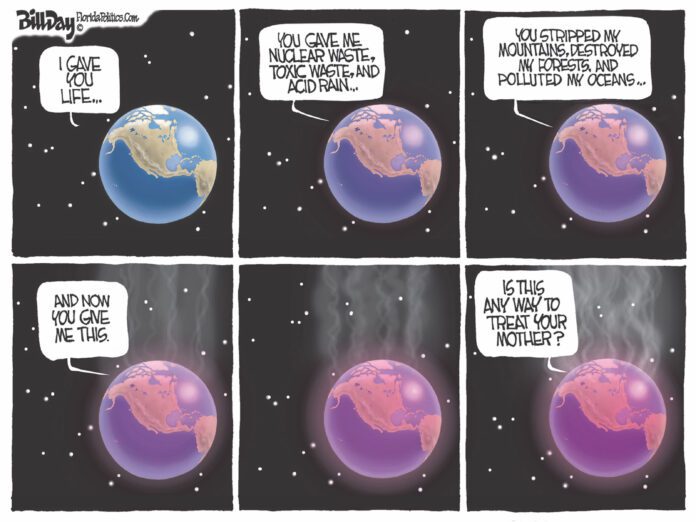Except for a three-day stint in an ice house, my first job was as an 18-year-old copywriter, turning out radio commercials – a raw rookie among seasoned vets. So, it grieved me mightily to learn in 2023 that Corsicana, TX’s KAND had gone silent.
The station got its call letters as a promo device from its first owner, Wolf Brand Chili, which sold “canned” chili. By the time I arrived, a new set of owners had transformed it to KAN-D, with a candy cane as the left leg of the K.
My main mentor was ad director Perry Taylor. His plan for continued growth was to get his advertisers to up their ad budgets by 10% each year.
Capitalism, like cancer, demands continued growth. A standard shibboleth of the Chamber of Commerce crowd is “If you’re not growing, you’re dying.”
An unfortunate corollary to this doctrine is that it encourages the exploitation of resources – and any people involved in their extraction, either workers or opponents, who threaten their profit margins. Our westward expansion under the politico-religious idea of Manifest Destiny exemplifies this development.
America’s credo of greed has managed to gloss over the collateral damage of its economic expansion. [“It ain’t too hard to get along with somebody else’s troubles.”] But as profitable as that has been, it requires unlimited resources to satisfy relentless continual growth.
Earth comes with finite limitations that refute this illogic.
This date, also known as the Ecological Debt Day, is calculated by the Global Footprint Network. It comes earlier each year.
“If the planet were a family,” 3Cat reports, “on August 1st it would have used up the entire annual budget and for the remaining five months of the year it would have to live on credit. But the credit of the Earth is not infinite and this date reminds us that our system of life is unsustainable and that it eats up the resources of future generations.”
Yes, we’ve been to the ends of the Earth. It ends.
In September, Science Daily reported similar finding from the University of Amsterdam:
“Our planet will only remain able to provide even the most basic standard of living for everyone in the future if economic systems and technologies are dramatically transformed and critical resources are more fairly used, managed and shared.”
The shrinking reservoir of resources is exacerbated by the “inequalities and overconsumption of finite resources by a minority.” Thus, “The only way to provide for everyone and ensure societies, businesses and economies thrive without destabilizing the planet is to reduce inequalities in how critical Earth system resources, such as freshwater and nutrients, are accessed and used – alongside economic and technological transformation.”
But reducing those inequalities would require the economic elite nations – and their citizens – to change their over-consumptive ways.
The report also offers a path toward prolonging that inequality, when, still according to Science Daily, it suggests: “Providing minimum resources for those who don’t currently have enough would add much less pressure on the Earth system than that currently caused by the minority who use far greater resources.”
But those inequalities are factored into the global economic system, and developing countries have shown no acceptance of the theory that they should have less so that we can have more.
And emerging from the multiple holiday season, we have ample examples of our over-consumptive paradigm. It is preached relentlessly though the inevitable collapse of a total consumption economy has been known for decades.
In 1973, John D. MacDonald had Travis McGee’s best buddy, economist [no first name] Meyer elucidate the problem in The Scarlet Ruse.
He first acknowledges the obvious limitations of natural resources that our 2024 study codifies:
“You come up against a bleak fact, Travis. There is not enough material on and in the planet to ever give them what we’re used to. The emerging nations are not going to emerge – not into our pattern at least. Not ever. We’ve hogged it all.”
After detailing the state of the ‘70s communication connections uniting the world – had he only known where we’d be today – Meyer explains that the outsiders, “can all look over into our corner and see us gorging ourselves and playing with our bright pretty toys. And so they want theirs now. Just like ours. God help them. And what is the only thing we say? ‘Sorry. You’re a little too late. We used it all up, all except what we need to keep our toys in repair and running and to replace them when they wear out. Sorry, but that’s the way it is.’”
We can hope that his conclusion is less accurate than this prediction:
“What comes after that? Barbarism, an interregnum, a new dark ages, and another start a thousand years from now with a few million people on the planet?”
The interregnum from 1973 to today has borne out one assertion – evident in the Republican-engineered destruction of the U.S. middle class. “Nobody in the world will ever live as well, materially, as we once did,” Meyer predicted correctly.
In November Science Daily posted another study, this one from the University of Groningen. The headline posed the question: “Can we live on our planet without destroying it?”
While capitalism resembles cancer in demanding continual growth, it shares the corollary of killing its host – in this case Planet Eden.
Mobilizing humanity to answer that query in the affirmative will require a complete reordering of priorities, an equinomics that prioritizes cooperation over competition. All that is standing in our way is our Great God Greed.







